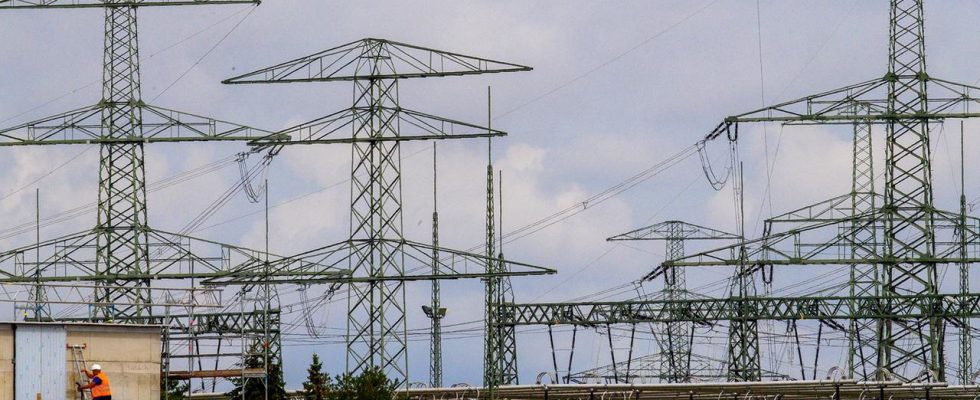Does the electricity price compromise make German companies more competitive? The feedback from the industry is poor, according to a survey by ARD-Capital Studios shows. There is also dissatisfaction in the SPD.
The German economy has long complained about high electricity prices. The federal government has therefore agreed on electricity price relief for industry, which will apply for five years. For the coming year, the relief should amount to up to 12 billion euros. Nevertheless, many companies are dissatisfied, as research by the ARD–Capital Studios show.
When asked, for example, the chemical company BASF wrote that it was good that the federal government had agreed on an electricity package that contained a number of positive measures. “However, according to initial estimates, the measures will not lead to an electricity price of 6 cents per kWh for BASF.” Six cents per kilowatt hour for energy-intensive companies that compete internationally – but that was the actual goal of Federal Economics Minister Robert Habeck.
“Just a bad compromise”
The Association of the Chemical Industry also writes this ARD-Capital Studio: “Compromises save coalitions, but not the industrial location in international competition.” The government’s electricity price package is not a liberation for the energy-intensive industry, “but just a bad compromise.” The measures would maintain the status quo, but would not bring the industry the relief it absolutely needed.
The Dow company is also active in the chemical industry. For example, in Stade in Lower Saxony, the company produces basic and specialty chemicals with over 1,000 employees.
When asked, the company wrote that it was a good step that the federal government had agreed on an electricity price package. “Based on our initial assessment, we assume that the announced measures will only have a minimal impact on us as an energy-intensive company.” In particular, it will not be possible to achieve an electricity price that is in the range of the desired bridge electricity price.
Dow continues: “A temporary bridge electricity price would have been the key to making Germany an internationally competitive industrial location and giving a boost to the transformation to a CO2-neutral value chain.” Unfortunately, this crucial lever is missing.
“Not a big deal”
Other energy-intensive industries also have doubts as to whether the federal government’s measures can have the desired effect. Volkswagen, for example, needs a lot of energy for its future battery cell production in Salzgitter. Dem ARD–Capital Studio When asked, the company writes that the economy now has planning security and that there will be relief for many across the board. “But entire areas of energy-intensive industries that are switching to green future technologies, such as the production of battery cells, continue to have to bear energy costs that are too high compared to their competitors.”
The steel industry draws a similar conclusion. Arcelor Mittal in Eisenhüttenstadt praises the reduction in bureaucracy contained in the package, but at the same time writes that the agreement is not the big deal: “The declared goal of competitive electricity prices for energy-intensive companies has not been achieved with this compromise.” The federal government must continue to face this urgent task.
Disillusionment in the steel industry
The situation is similar at Stahl-Holding-Saar. The company writes that they welcome the fact that there is movement on the issue of electricity prices: “The concrete reduction in the electricity price to six cents would have been a clear signal towards energy-intensive companies.”
If we want to preserve Germany as an industrial location, there must be a permanent solution with internationally competitive electricity prices in sufficient quantities. This creates trust in Germany as an industrial location and is a prerequisite for companies to make the necessary investment decisions. The Saarland company cannot currently achieve the electricity price of six cents announced by the government.
See SPD politicians Need for improvement
The fact that industrial companies are not satisfied with the traffic light decision has apparently also reached politics. Lower Saxony’s Prime Minister Stephan Weil (SPD) said this last Sunday ARD–Capital Studio, the international competitiveness of companies is the benchmark. His impression is: “There is still work to be done.”
Yesterday, SPD parliamentary group leader Rolf Mützenich referred to problems with state aid law at the EU level, which had prevented the path that his group had preferred from being taken. The politician obviously had a hard time publicly approving of the compromise.
And Saarland Prime Minister Anke Rehlinger (SPD) is not yet satisfied either. When asked, she said that something was finally happening on the issue of electricity prices, but that it wasn’t enough: “We have to see that we in Germany are significantly more expensive than other countries.” The measures proposed so far do not sufficiently compensate for this for everyone. The last word on the subject of industrial electricity prices does not yet appear to have been spoken.

